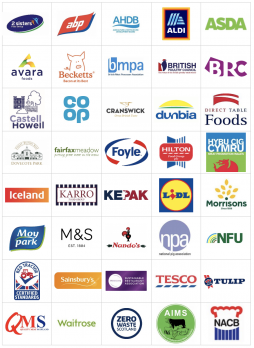Some of the UK's biggest meat companies, trade organisations and major retailers have announced their commitment to halving the amount of meat that goes to waste each year as part of the 'Meat in a Net Zero World' agreement.

- Helping deliver productivity improvements, greenhouse gas (GHG) emissions reductions and protection of natural assets (e.g. soil, water) during livestock (cattle, sheep, pigs) and poultry rearing;
- Sourcing soya for use in feed that is cultivated in a way that protects against conversion of forests and valuable native vegetation;
- Large meat processors, retailers, and hospitality and foodservice businesses will continue to take action to reduce their own operational food waste, GHG emissions and water impacts;
- Helping to halve the amount of meat thrown away at home.
“Addressing food waste, particularly from meat production, is crucial in reducing emissions throughout the supply chain. From farmer to factories, we know it’s forward-thinking ambitions that can help influence climate action when it comes to protecting the planet. Above all, it’s crucial that in a world where retail touches so many, we make a real positive difference.”“It is key that the focus is on every link in the supply chain from production, processing and sale, through to the customer – whether they are eating in or outside of the home. I’m confident that Meat in a Net Zero world will have a significant impact towards achieving our national and global targets. And believe this has the potential to become a blueprint that other nations will emulate.”‘Meat in a Net Zero world’ says it will help deliver against a number of industry initiatives including the NFU’s Net Zero vision, the European Roundtable for Beef Sustainability/UK Cattle Sustainability Platform and the UK Roundtable on Sustainable Soya.WRAP added that greater collaboration will also help accelerate progress towards achieving targets set out in Courtauld 2025 and the UN’s Sustainable Development Goal 12.3 to halve per capita food waste by 2030.NFU livestock board chairman, Richard Findlay, said: “This collaboration will go a long way to supporting the NFU’s vision of net-zero agriculture by 2040 and British livestock farmers are ready to play their part.“When it comes to primary production, having a shared goal and strategy will help make sure all livestock farmers are moving in the right direction.“Beyond the farm gate, it is a great opportunity to make improvements throughout the meat supply chain to reduce our collective carbon footprint, and it is important that every part of the supply chain is considered alongside the opportunities to reduce waste at home.”Food wasteWRAP estimates that each year around 380,000 tonnes of the meat intended for consumption goes uneaten, with the GHG emissions associated with this uneaten meat measuring more than 4 million tonnes CO2 equivalents.Much of this meat is discarded in the home, but there are important actions to take at all points across the supply chain. A dedicated Meat Sector Working Group was convened by WRAP under Courtauld 2025 that brought together key stakeholders to identify the areas of biggest impact, and opportunities to overcome barriers and avoid just moving problems along the supply chain.Anna Proffitt, policy technical manager for the BMPA, said: “Increasing efficiency and reducing waste along the meat supply chain is of paramount importance to the sustainability of the sector. We fully support WRAP in bringing the meat supply chain together to undertake such important work and are pleased that many of our members are signatories and active participants of Meat in a Net Zero world. We look forward to working closely with WRAP and members in driving the common objectives forwards.”Leah Riley Brown, sustainability policy advisor at the British Retail Consortium which also backed the report, said: “Retailers recognise the key part they have in tackling climate change and the leverage they can use to help reduce the environmental impact of the materials and manufacturing processes in our everyday products.“Addressing food waste, particularly from meat production, is crucial in reducing emissions throughout the supply chain. From farmer to factories, we know it’s forward-thinking ambitions that can help influence climate action when it comes to protecting the planet. Above all, it’s crucial that in a world where retail touches so many, we make a real positive difference.”The full report can be viewed here.
This story was originally published on a previous version of the Meat Management website and so there may be some missing images and formatting issues.












